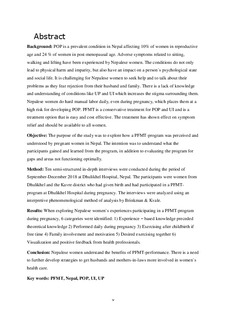| dc.description.abstract | Abstract
Background: POP is a prevalent condition in Nepal affecting 10% of women in reproductive age and 24 % of women in post-menopausal age. Adverse symptoms related to sitting, walking and lifting have been experienced by Nepalese women. The conditions do not only lead to physical harm and imparity, but also have an impact on a person`s psychological state and social life. It is challenging for Nepalese women to seek help and to talk about their problems as they fear rejection from their husband and family. There is a lack of knowledge and understanding of conditions like UP and UI which increases the stigma surrounding them. Nepalese women do hard manual labor daily, even during pregnancy, which places them at a high risk for developing POP. PFMT is a conservative treatment for POP and UI and is a treatment option that is easy and cost effective. The treatment has shown effect on symptom relief and should be available to all women.
Objective: The purpose of the study was to explore how a PFMT-program was perceived and understood by pregnant women in Nepal. The intention was to understand what the participants gained and learned from the program, in addition to evaluating the program for gaps and areas not functioning optimally.
Method: Ten semi-structured in-depth interviews were conducted during the period of September-December 2018 at Dhulikhel Hospital, Nepal. The participants were women from Dhulikhel and the Kavre district who had given birth and had participated in a PFMT-program at Dhulikhel Hospital during pregnancy. The interviews were analyzed using an interpretive phenomenological method of analysis by Brinkman & Kvale.
Results: When exploring Nepalese women`s experiences participating in a PFMT-program during pregnancy, 6 categories were identified: 1) Experience – based knowledge preceded theoretical knowledge 2) Performed daily during pregnancy 3) Exercising after childbirth if free time 4) Family involvement and motivation 5) Desired exercising together 6) Visualization and positive feedback from health professionals.
Conclusion: Nepalese women understand the benefits of PFMT-performance. There is a need to further develop strategies to get husbands and mothers-in-laws more involved in women`s health care.
Key words: PFMT, Nepal, POP, UI, UP | |
